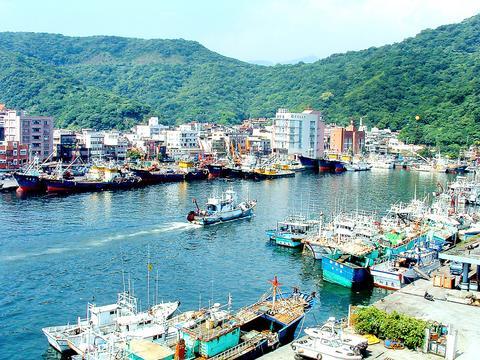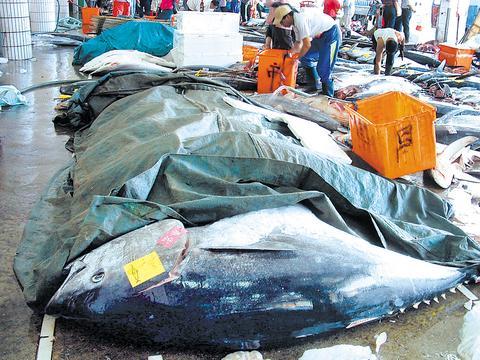For bluefin tuna gourmets living in northern Taiwan, Nan Fang Ao (南方澳) in Ilan County is an alternative to Pingtung's famous Tungkang.
Tourists have flocked to this fishing port for years to enjoy bluefin tuna in the summertime. In the seafood restaurants surrounding the harbor, top-quality toro for two people (7 pieces) could cost up to NT$1800. But gourmets are willing to pay.

PHOTO: LINDY YEH, TAIPEI TIMES
Bluefin tuna is a seasonal fish that appears in the western Pacific Ocean from Japan to the Philippines between April and July. The adult fish swim to this area to lay their eggs, and the season peaks in May and June.

PHOTO: LINDY YEH, TAIPEI TIMES
Toro is a Japanese term referring to the belly section of a bluefin tuna. The belly is considered the best part of the fish, and gourmets in Japan and Taiwan usually enjoy it raw, served like Japanese sashimi.
The belly is further classified into three grades, with the most delicious part at the front called o toro, the second-best part in the middle dubbed jo toro, while the back belly flesh is regarded as third-quality.
"Our business doubles when the Tungkang bluefin tuna festival begins," said Chu Wan-tsai (朱萬財), owner of the 24-year-old Chin Man Tzai restaurant (金滿載) located near Nan Fang Ao's fishing harbor.
According to Chu, the Tungkang bluefin festival has promoted the fish with great success.
Nan Fang Ao, a remote port village that could hardly be found on Taiwan maps only 10 years ago, has found fame thanks to its booming bluefin industry.
The village first won literary fame in a 1999 book, The Rise and Decline of the Nan Fang Ao Theater (南方澳大戲院興衰史), written by Chiu Kuen-liang (邱坤良), president of the Taipei National University of the Arts. The book became a bestseller as soon as it reached bookstores because its memoir-like style touched collective memories of village life and childhood.
After the book's release, people began to look for Nan Fang Ao's location. The village is 5km from Suao, a major commercial port in eastern Taiwan.
According to Chiu, although Nan Fang Ao fishermen's interactions with Chinese coastal cities have been frequent, the village has been a traditional stronghold of the Democratic Progressive Party (DPP).
Nan Fang Ao's fishermen listened to Chinese radio broadcasts for information about the weather at sea, a practice that used to be prohibited by Taiwan's "three noes policy" that mandated "no contact, no dialogue and no compromise."
Nan Fang Ao fishing boats often took shelter from storms and typhoons in Chinese harbors and were received warmly by China's "great motherland government" during the 1970s and 1980s, when cross-strait relations were highly antagonistic, Chiu said in his book. As "direct links" are still prohibited by the government, a fleet of six Nan Fang Ao fishing vessels broke the law by sailing to Fujian Province's Meichiou (湄洲) in May 2000 to worship the maritime goddess Matzu (媽祖).
These contacts with China have not affected the villagers' voting behavior, as the majority support the DPP as firmly as elsewhere in Ilan County.
Since the mid-1990s, advances in fishing equipment and the blufin tuna season have brought a tourism boom to Nan Fang Ao. The fishing industry has also attracted fishermen from Southeast Asian countries who have added multicultural elements to the village. In the evening, tourists enjoying ocean breezes may see young foreign fishermen chatting along the harbor and sometimes smiling at strangers.
According to Chen Tien-fu (陳添福), a Suao fishing association official at the fish market, large-scale bluefin tuna fishing began in 1994, and 80 percent of the catch initially was exported to Japan.
"But since four years ago, with the great success of Tungkang's bluefin tuna festival that has created a huge domestic market for the fish, only 20 percent of the catch is exported to Japan and the remaining 80 percent is for local clients," said Chen.
Though Nan Fang Ao's annual catch is smaller than Tungkang's, the Ilan County government is ambitiously commercializing the bluefin tuna.
In order to develop sophisticated bluefin cuisine beyond sashimi preparations, the Ilan County government offers cooking lessons for professional chefs and issues certificates for trained cooks and their restaurants.
As in Tungkang and some famous Japanese restaurants in Taipei, visitors to Nan Fang Ao can select from various bluefin tuna dishes.
Yet even though bluefin tuna cuisine has diversified, Chu said, "our gourmet clients want nothing but o toro sashimi. They don't care about the price, as long as you give them the best."
The success of bluefin tuna-related industries has also triggered worries about depletion of bluefin tuna stocks. Local environmental groups have urged fishing authorities to take restrictive measures to assure the sustainbility of the resource.
"Due to the overcatching of bluefin tuna, the fish the fishermen have caught are smaller in terms of size and quantities yearly. Without any sustainability measures imposed by the government, we don't know how long the annual bluefin tuna festival can last," said Lee Yung-jan (李永展), chairman of the Green Citizens' Action Alliance, in an article published last month.
Lee suggested imposing a harvest ceiling for each fishing boat, or regulating the size of fish that can be caught.
"Most important, ecological studies are needed on the annual fish festival's impact," Lee said.
However, Chen is skeptical about the ecologists' concerns.
"The harvests are fluctuating, as you may see in the statistics, due to many complicated elements, such as the sea current, food supplies and the size of fish schools," Chen said.
He said this year's catch in Nan Fang Ao is expected to be smaller than last year's mainly because Japanese navy patrols are much tougher this year in the overlapping territorial waters claimed by both Taiwan and Japan.
"They have constantly chased our fishing boats in that area this year. In addition, the price of squid, which is used as the bait for bluefin tuna, is double what it was last year. So many fishing boats have given up catching bluefin tuna this year," Chen explained.
Regarding the environmentalists' concerns, the Fisheries Administration said that setting stricter regulations on bluefin tuna fishing does not involve Taiwan alone.
"Since there are many countries involved in the bluefin tuna fishery, international organizations are the proper place to set rules for the countries involved. As long as new regulations are agreed upon by [all] involved countries, we are willing to abide by them," said Wu Man-chuan (吳滿全), a Fisheries Administration section chief.
The international organization in charge of this area's bluefin tuna fishery is the Western and Central Pacific Fishery Commission, of which Taiwan is a member.

Several Chinese Nationalist Party (KMT) officials including Chairman Eric Chu (朱立倫) are to be summoned for questioning and then transferred to prosecutors for holding an illegal assembly in Taipei last night, the Taipei Police said today. Chu and two others hosted an illegal assembly and are to be requested to explain their actions, the Taipei City Police Department's Zhongzheng (中正) First Precinct said, referring to a protest held after Huang Lu Chin-ju (黃呂錦茹), KMT Taipei's chapter director, and several other KMT staffers were questioned for alleged signature forgery in recall petitions against Democratic Progressive Party (DPP) legislators. Taipei prosecutors had filed

Taiwan would welcome the return of Honduras as a diplomatic ally if its next president decides to make such a move, Minister of Foreign Affairs Lin Chia-lung (林佳龍) said yesterday. “Of course, we would welcome Honduras if they want to restore diplomatic ties with Taiwan after their elections,” Lin said at a meeting of the legislature’s Foreign Affairs and National Defense Committee, when asked to comment on statements made by two of the three Honduran presidential candidates during the presidential campaign in the Central American country. Taiwan is paying close attention to the region as a whole in the wake of a

NEW WORLD: Taiwan is pursuing innovative approaches to international relations through economics, trade and values-based diplomacy, the foreign minister said Taiwan would implement a “three-chain strategy” that promotes democratic values in response to US tariffs, Minister of Foreign Affairs Lin Chia-lung (林佳龍) said. Taiwan would aim to create a “global democratic value chain,” seek to capitalize on its position within the first island chain and promote a “non-red supply chain,” Lin was quoted as saying in the ministry’s written report to the Legislative Yuan submitted ahead of the legislature’s Foreign Affairs and National Defense Committee meeting slated for today. The Ministry would also uphold a spirit of mutual beneficial collaboration, maintaining close communication and consultations with Washington to show that Taiwan-US cooperation

Taiwan and the US have begun trade negotiations over tariffs imposed by US President Donald Trump earlier this month, Minister of Foreign Affairs Lin Chia-lung (林佳龍) said in an interview this morning before reporting to the Legislative Yuan’s Foreign Affairs and National Defense Committee. The Taipei Economic and Cultural Representative Office (TECRO), Taiwan’s de facto embassy in the US, has already established communication channels with the US Department of State and the US Trade Representative (USTR), and is engaging in intensive consultations, he said. Points of negotiation include tariffs, non-tariff trade barriers and issues related to investment, procurement and export controls, he